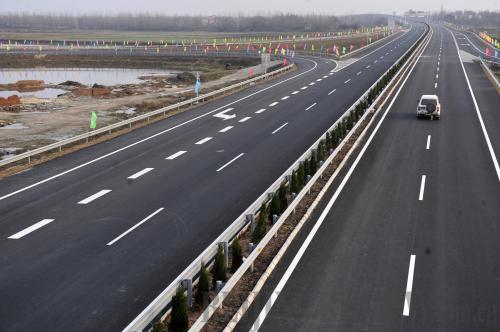|
 |
|
PRIVATE FOOTPRINTS: Yuenan Expressway, the longest expressway in Hubei Province, was completed by a privately owned company (HAO XIANGQIAN) |
Private investments grew 28.6 percent in the first half of 2010, while state-owned and state-controlled investments were up 21.5 percent, said statistics from China's central bank.
But private investment could be growing much faster. Barriers loom large, and discrimination against private investors remains prevalent in some traditional and monopolized industries. Banks favor large projects and state-owned enterprises, which poses a substantial challenge to private companies during fund raising.
Most of China's 4 trillion yuan ($586 billion) of stimulus package had been earmarked by the end of 2009, with a majority of it going to state-owned enterprises. Some local governments even expanded the state-owned sector and allowed it to account for a larger part of the local economy through restructuring and integration, making it even more difficult for private capital to survive.
NDRC statistics showed private capital is less visible in traditional and monopolized industries, accounting for 13.6 percent in power and heat generation and supply industries, 12.3 percent in education, 11.8 percent in health care and social security, 9.6 percent in finance, 7.8 percent in computer services and software, 7.5 percent in logistics, 6.6 percent in water conservancy, environment and public facilities management, and merely 5.9 percent in public management and social organization.
Huang said 2010 would be a challenging year for the Chinese economy, especially in terms of ensuring that the economic recovery continues to gather steam while the government decreases its involvement. Measures have to be adopted to effectively promote private investment and turn public savings into investment, letting them become a motive force for fast economic growth, he said.
The State Council opened some monopolized industries to private capital in 2005, but private companies have developed slowly in these areas, even after the introduction of a new guideline in May this year. The sluggish expansion is largely due to the monopoly still enjoyed by state-owned enterprises today, which has hindered private investments in these sectors. The Central Government is determined to break down these monopolies, but local governments and relevant ministries are slow to implement the policies since they share certain benefits with the monopolies to some extent, he said.
Prompt implementation of the policies, the Central Government has stated, will be necessary to encourage and guide private investment, which will help clear the way for private investment to flourish, Chen said.
If these commitments are fulfilled, private investors will be more active in bringing decisive changes to China's current economic structure, he said.
Evolution of Private Economy
A string of policies have allowed China's private economy to develop from one barely existent in 1949 after the founding of New China to one that now accounts for more than half of the country's total economic output. The development is generally divided into five phases:
1949-79 Private companies were almost extinguished on the Chinese mainland.
1979-82 Self-employed and private businesses appeared in urban and rural areas following the beginning of China's rural reform in late 1978.
1982-92 The private economy was legitimately recognized by the 1988 amendments to China's Constitution and has since flourished.
1992-2005 Private sector development took off after Deng Xiaoping issued explicit statements during a tour of south China to encourage the development of private companies and private capital. The private sector was recognized as an important part of China's socialist market economy at the 15th National Congress of the Communist Party of China in 1997, which further promoted its development.
2005-present The private economy has been given unprecedented opportunities to grow during this period, thanks to an array of policies introduced to encourage and guide its sound development. | 